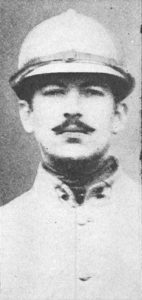
Poet Alan Seeger wrote “I Have a Rendezvous with Death” sometime during World War I. His premonition proved accurate. Seeger was shot in the stomach and died in 1916 during the Battle of Somme.
The first few lines of “I Have a Rendezvous with Death” read as follows:
“I have a rendezvous with Death
At some disputed barricade.
When Spring comes back with rustling shade
And apple blossoms fill the air –
I have a rendezvous with Death
When Spring brings back blue days and fair.”
“I Have a Rendezvous with Death” is not the only poem Seeger wrote about facing his own death. He longed for a young hero’s demise. In 1915, when he was serving in the French Foreign Legion, he wrote to a friend, “If it must be, let it come in the heat of action. Why flinch? It is by far the noblest form in which death can come. It is in a sense almost a privilege.”
Alan Seeger attended college at Harvard where he made friends with luminaries like T.S. Eliot. After college, he lived the life of a bohemian poet. After his father cut off his allowance, Seeger ended up sleeping on a friend’s couch. Bored and in search of adventure, Seeger eventually moved to France.

Credit: en.wikipedia.org
World War I broke out while he was there. Seeger wanted to fight with the allies, but he could not join the French army because he was an American citizen. He finally joined the French Foreign Legion in 1914. As he had hoped, he died a hero. He was posthumously awarded the Croix de Guerre and the Medaille Militaire.
None of Seeger’s poetry was published until after his death. And at the time, it received mixed reviews. Some critics thought “I Have a Rendezvous with Death” was over-idealized, outmoded and impersonal. But many of the kinder critics, including Eliot, pointed out that Seeger had died very young. Had he lived longer, he would have had time to strengthen and improve his writing.
Not everybody criticized “I Have a Rendezvous with Death,” however. President John F. Kennedy declared it was one of his favorite poems and often asked his wife to recite it for him.
Each individual has to decide how to deal with death, especially people who face it on a daily basis. Or as Seeger wrote,
“It may be he shall take my hand
And lead me into his dark land
And close my eyes and quench my breath.
It may be I shall pass him still.”
In “I Have a Rendezvous with Death” Seeger writes about having a premonition of his own death. He is sure he will be dead by spring – in fact, he died on July 4. He also speculates about what it will be like to stand in the presence of death.
Sadly, Alan Seeger did not live long enough to truly hone his craft. He did, however, produce some poems that challenge readers to think about their own mortality.

 “I Have a Rendezvous with Death” by Alan Seeger
“I Have a Rendezvous with Death” by Alan Seeger


 “Hand to Earth” by Andy Goldsworthy
“Hand to Earth” by Andy Goldsworthy
 Trans Remembrance Project Provides a Community of Grieving
Trans Remembrance Project Provides a Community of Grieving
 Caring for a Dying Loved One? Be Gentle With Yourself.
Caring for a Dying Loved One? Be Gentle With Yourself.














